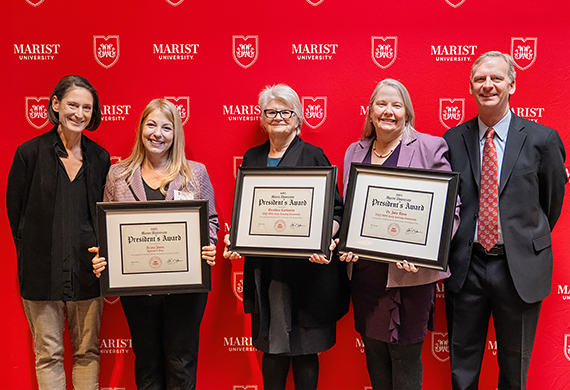A New Era for the Historic Cornell Boathouse
Marist has restored the last remaining boathouse from famed Regatta Row, home to crews competing in the premier college rowing event in the early 1900s, the Intercollegiate Rowing Association's national championship.
Just in time for New York State's Hudson-Fulton-Champlain Quadricentennial celebration of the Hudson River, Marist has restored its historic Cornell Boathouse. Now a popular venue for College functions, the boathouse was once part of famed Regatta Row, home to university rowing teams competing in the Intercollegiate Rowing Association's national championship on the Hudson in Poughkeepsie, N.Y., one of the most popular athletic events in the nation.

Restorations on the historic Cornell Boathouse include a new deck.
The Golden Age of Collegiate Rowing
The golden era of collegiate rowing began in 1895, after representatives from Cornell University, Columbia University, and the University of Pennsylvania selected the Hudson River at Poughkeepsie, because of its four miles of straightaway, as the site of regattas for their newly formed Intercollegiate Rowing Association. Over the next 50 years, Poughkeepsie hosted the premier crew event in America.

The Cornell Boathouse, shown (far left) in 1948, was once part of famed Regatta Row. Photo courtesy of Marist College Archives and Special Collections.
The Marist College Archives and Special Collections web site describes the scene:
"Every year tens of thousands of spectators would come pouring into Poughkeepsie to watch the races. They covered the shores next to the river, many waiting all day, picnicking on blankets, to ensure they had a good view. The railroad tracks on the west side of the river had a flatbed train which held grandstands from which spectators could watch the race. As the crews rowed up the river, the train would keep pace with them, giving the people on board the best view possible. Hundreds of boats, yachts, and occasionally even Navy destroyers sailed to Poughkeepsie, mooring on the sides of the river to watch the event. Poughkeepsie came alive on the day of the regatta, with parades, bands, vendors, and banners. The regatta was extensively covered by newspaper reporters, and as time went on it was even broadcast over local and national radio stations. But the crowds, cheers, reporters, parades, and pennants were not the reasons why the regatta became so intensely popular. The explanation lay in the physical feats of the crew teams. To race at full-speed for four miles required such a breathtaking amount of strength, skill, and endurance that it was awe-inspiring to watch."
In 1949 race officials moved the regatta to Marietta, Ohio, for two main reasons. Marietta had promised to raise at least $10,000 more for the regatta than Poughkeepsie did. And the race in Marietta was to be held on a lake, which meant that tides would no longer dictate the race schedule.
In Need of Repair
Cornell, the University of California, the University of Washington, and the University of Wisconsin each came to have boathouses on Regatta Row. Today, the Cornell Boathouse is the only one remaining. Marist acquired the boathouse in 1977. An agreement with the City of Poughkeepsie permitted the College to obtain title to the boathouse and surrounding land in exchange for allowing local high school rowing programs to use the boathouse until 2002.
But the boathouse was in poor condition. "We were already in the midst of renovating the entire waterfront area," says Justin Butwell, director of Marist's physical plant. "We wanted to keep the Cornell Boathouse, but a number of renovations were needed."
Restoration began in 2004 with some small improvements. Workers added new windows and replaced rotting outer shingles. In the following years, they tore down several inner walls, installed insulation, replaced the deck, repainted the ceiling beams, and added an elevator. An environmental science lab on the outer wing was also renovated.
Paying Tribute
The original wooden beams remain overhead. And a plaque over the fireplace further alludes to the building's past: "The Cornell Navy records its gratitude to the City of Poughkeepsie and to Peter Henry Troy whose combined efforts made possible the erection of this boathouse."
Troy, a Dutchess County native and local banker, was known among oarsmen, coaches, and rowing fans for his hospitality and unflagging support of the regatta. He organized the Poughkeepsie Regatta Committee and chaired it for 25 years, persuading city officials to contribute each year to the IRA's Board of Stewards to shoulder some of the expense of the event. He also convinced the officials to build permanent lodging for the crews, resulting in the boathouses on Regatta Row. On learning that Troy would resign as head of the committee in 1940, Lawrence Perry wrote in the New York Sun that the time-honored event would be losing an irreplaceable advocate. "The impress of his personality upon this regatta is deep and pervasive. Results of his constructive enterprise are found in the very spirit of regatta day on the Hudson."
Although the IRA Championship never returned to Poughkeepsie, on Oct. 3 Marist will reenact it. The Quadricentennial Regatta will bring back teams from the three original contenders-Cornell, Columbia, and Penn-as well as Marist, Vassar, Syracuse, Army, and Navy. The location for a special pre-race dinner for the competitors will be the historic Cornell Boathouse.



